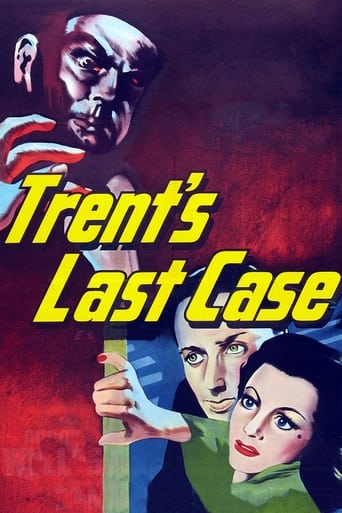gridoon2018
"Trent's Last Case" is not a classic, but it's a nice little cozy mystery. It is well-plotted, and by watching it a second time you can see how well the entire story hangs together (though the very last twist does not really change the essence of the story - but maybe that was precisely the point). There is also a distinguished British cast (Margaret Lockwood is accurately described within the film as "very beautiful, dark, and self-possessed"), plus an eccentric and quite fascinating turn by Orson Welles, who despite his third billing appears only in the last half-hour, in flashbacks. The director doesn't do anything phenomenal, but he doesn't do anything wrong, either; the settings are opulent but do not overwhelm the story. I believe most genre fans will enjoy this one. **1/2 out of 4.
blanche-2
Michael Wilding takes up "Trent's Last Case" in this 1952 film directed by Herbert Wilcox for Republic Studios. It's British with a British cast that includes Margaret Lockwood, John McCallum, Hugh McDermott, and one American, Orson Welles, who was probably trying to raise money for a project.Trent is an artist and also an amateur detective. He gets involved in the suicide of a wealthy man named Manderson, but as he investigates, it looks more and more like murder. One suspect stands out, but how to prove it? Unlike many detectives in books and movies, Trent is fallible. This is a neat mystery with a few red herrings. I don't agree that it was dull; I think the story itself keeps the film going, as well as the attractive Michael Wilding. Wilding falls in with many of those tall, good-looking British actors from the '50s - Robert Flemying, Michael Rennie, etc., and probably wouldn't be well known here if he hadn't married Elizabeth Taylor. Nevertheless, he was quite urbane with a great voice and acquits himself well as Trent. Margaret Lockwood is lovely as the victim's widow, and she keeps you guessing.Not as bad as some reviewers claim. Maybe not as good either, but I enjoyed it. Orson Welles apparently had an obsession with using fake noses on his characters. It's really obvious in profile.
dbborroughs
Armchair detective gets involved in the case of the death of a rich man. The inquest says suicide- but ends are left hanging so Trent investigates.Stoggie formal British mystery with Orson Welles in flashbacks playing the dead man with a pointy nose, too much make up and raised eyebrows. He's in over acting mode chewing the scenery in his "look at me style". He's in the film for just over ten minutes but all I remembered was his bad acting and silly nose.As for the rest of the film it's an okay time waster, but it's not much beyond that. It's a long 90 minutes
brice-18
It's good news for Welles completists that this, the better of the two films he made for Herbert Wilcox in 1952 (to help finance his on-off-on but finally magnificent film of 'Othello') is now available on DVD, though dismally free of extras. As a thriller it is a puzzle almost devoid of suspense, though there are some clever twists at the end. There are polished performances by Margaret Lockwood, John McCallum, Michael Wilding as the classy sleuth Trent, Miles Malleson in one of his best roles and Welles. Welles appears for no more than 20 minutes, in flashback, but, with his formidable false nose, is an intimidating presence as the late Sigsbee Manderson. In a fraught dialogue with McCallum he talks about 'Othello' and the production he's recently seen: "Didn't like the leading actor!" The leading actor was Welles himself, performing at the St James' theatre - a performance I was privileged have seen a year or two earlier, when Ken Tynan, long before PC was thought of, headed his review 'Citizen Coon'!



